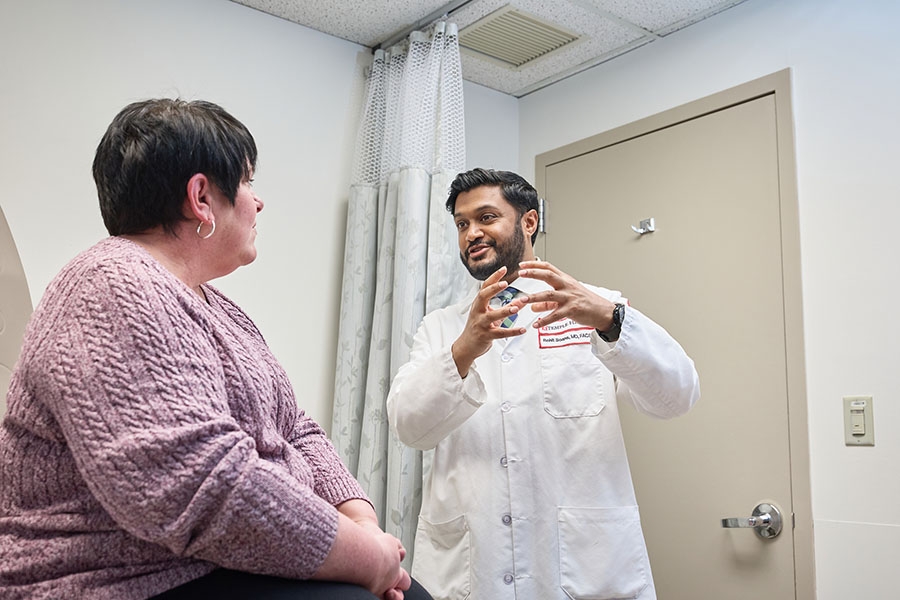Maintaining good nutrition is important for everyone. It can be especially important if you’ve been diagnosed with chronic obstructive pulmonary disease. COPD is a group of diseases including emphysema and chronic bronchitis that cause airflow blockage and breathing-related problems.
How COPD Can Affect What You Eat
If you’re living with COPD, breathing can require a lot of energy. A side effect of COPD is the reduced ability to exhale carbon dioxide. Metabolism of certain foods — such as healthy fats — produces less carbon dioxide for the amount of oxygen used than the metabolism of other foods, such as carbohydrates.
For this reason, fueling your body with a diet lower in carbohydrates and consisting of healthy fats rather than unhealthy fats can help you breathe easier. But it's not just as simple as eating fewer carbs and healthier fats. The kind of food you eat matters. You should stick to nutritious options that don’t cause bloating — another issue that can make breathing more difficult.
Maintaining a COPD-friendly diet that helps you breathe better doesn’t have to be complicated. Read these simple swaps you can start making today. Then, download a copy of these tips to keep handy or share with loved ones.
1. Choose the Right Kinds of Fats.
Eat This:
When eating a higher fat diet, opt for nutrient-dense options. Avocados, nuts, seeds, coconut oil, olive oil, fatty fish and cheese are good choices.
Not That:
Avoid fried foods such as French fries, fried chicken, fried fish and onion rings. When foods are fried, they become extra greasy and need more effort to digest. The bloating that results can make it difficult to take full breaths.
2. Go for Complex Carbohydrates.
Eat This:
Eating a higher fat, lower carb diet does not mean avoiding all carbs — it means choosing the right carbs. Go for complex carbohydrates that are high in fiber to help your digestive system. This includes bran, lentils, quinoa, oats, potatoes (with the skin) and barley.
Not That:
Simple carbohydrates generally contain little nutritional value. Look at labels and avoid foods with sugar, corn syrup and high-fructose corn syrup, glucose, fructose and sucrose. This includes a lot of processed foods such as packaged snacks and cereals, white bread and pasta.
3. Opt for the Right Fruits and Vegetables.
Eat This:
Choose a colorful diet filled with nutrient-dense fruits and vegetables. Reach for more digestible fruits and vegetables that do not cause bloating — leafy greens, cucumbers, bell peppers, carrots, berries, pineapple and grapes.
Not That:
Fruits and vegetables have wonderful nutritional value. But, some can give people with COPD indigestion and bloating, making it harder to breathe. Pay attention to how you feel when eating the following fruits and vegetables:
- Apples, apricots, peaches and melons
- Cauliflower, broccoli, radishes, Brussels sprouts, cabbage and kale
If you don’t notice any bloating or indigestion, continue to eat them freely.
4. Sip Drinks That Hydrate and Thin Mucus
Drink This:
Water! Unless instructed otherwise by your doctor, drink 6-8 glasses of water every day. It can help keep your mucus thin, which means it’s easier to cough up. Want something more flavorful? Try infusing your water with fresh fruit, or sip on herbal or green tea (warm or iced).
Not That:
Some people with COPD may feel symptoms worsen after drinking alcoholic or caffeinated beverages. It’s best to limit your consumption of these and stick to water as much as possible.
Alcohol and/or caffeine could interfere with your COPD medication, so be sure to consult your doctor. You should also avoid sugary drinks such as juice and soda.
5. Stick to a Nutrition Plan.
When you have COPD, it’s also important to make mealtimes as stress-free as possible. With a little planning, you can form healthy eating habits. Here are some tips and guidelines to help you stick to a COPD-friendly nutrition plan:
Eat Small Meals
Instead of eating 3 large meals, try eating 5-6 smaller meals throughout the day. This will help you avoid a full stomach, giving your diaphragm and lungs more space to move freely.
Meal Prep
When living with COPD, you don’t want to spend too much energy preparing meals. Try breaking it up by doing meal prep in advance so you can throw meals together quickly. For example, chopping vegetables ahead of time.
Ask for Help
Recruit others to make meals easier. Ask friends and family to help with grocery shopping or meal preparation. You can also try a grocery or meal prep delivery service. These services are available for a range of budgets. Or, do some research to see if you qualify for a home delivery meal service.
Eat Slowly Now and Drink Later
If you find that you experience shortness of breath while eating, try to take your time with small bites. Chew food thoroughly, and eat while sitting upright. You can also try drinking water at the end of your meal, rather than taking sips between bites. This can help prevent bloating that can aggravate shortness of breath.
We’re Here to Support You
Follow your doctor’s dietary guidelines. If you make changes to your nutrition plan and don’t feel that the changes are helping your COPD, schedule an appointment at the Temple Lung Center for support.
Looking for more information about COPD? Check out the following resources:
Best Food Choices for COPD
Want to keep a handy list of what you should eat or share it with a loved one? Download a copy of our COPD Diet Tips infographic.


